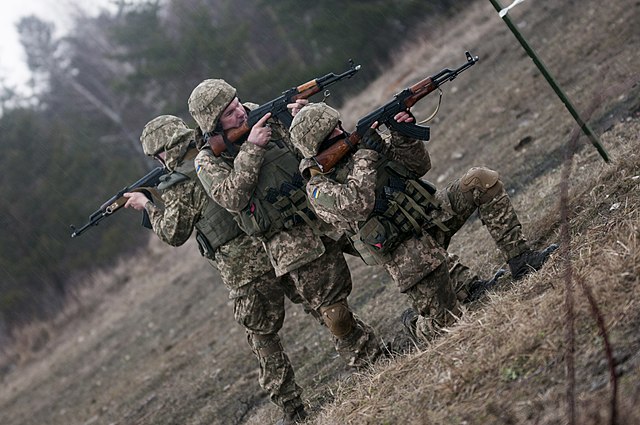 Credit: Sgt. Anthony Jones, 45th Infantry Brigade Combat Team
Credit: Sgt. Anthony Jones, 45th Infantry Brigade Combat Team
EVENT RECAP: War in Ukraine: Rapid Response Briefing with Chuck Hagel, Former Secretary of Defense
On February 28, the American Security Project hosted a rapid response briefing on the war in Ukraine with Chuck Hagel, former Secretary of Defense. Secretary Hagel, who served as Secretary of Defense under President Obama from 2013 until 2015, and currently serves on the Board of Directors of ASP, joined ASP CEO Patrick C. Costello to share his views on the ongoing conflict, how the war in Ukraine might evolve, and the future of NATO expansion.
The discussion opened by Costello asking Secretary Hagel to discuss the response to Russia’s 2014 invasion of Ukraine and annexation of Crimea, how he advised President Obama and then-Vice President Biden, and how that situation differs from the crisis of today. Hagel addressed the decision to provide non-lethal assistance to Ukraine, the debate over lethal assistance, and the sanctions levied on Russia for that act of aggression. Hagel also addressed coordinating the response with the European Union and NATO. He recalled that the matter was the subject of daily meetings at the NSC principals committee.
This is a critical moment for global energy policy. So far, Russia’s energy sector has largely been spared from the West’s sanctions, though it is one of the country’s most important industries. Russia is the world’s third-largest crude producer, providing roughly 10 percent of the world’s oil and the second-largest natural gas producer. Costello asked about imposing sanctions on Russia’s energy sector, implications for Americans, the risk of a spike in energy prices as well as supply disruptions, and how inflation complicates matters. Secretary Hagel noted that the world will be significantly impacted by this conflict, as seen by recent oil prices. However, the U.S. can increase LNG exports through domestic production and encourage other producers, such as Qatar, to increase production to address supply disruption. This will not necessarily replace Russia completely in terms of natural gas supply. Still, the European Union has been diligently working with the U.S. to secure its energy supply and minimize price increases.
Costello then inquired about the economic dynamics of this conflict. Putin has built a “fortress economy” and amassed over $600 billion in foreign currency reserves to insulate the Russian economy. Nevertheless, the stinging sanctions imposed on Russia will start to bite. Secretary Hagel suspected that Putin and the Russian elite would begin to feel the impacts of the sanctions within a week. Another item to consider is that Russia has few allies, and its relationship with China is a mutual partnership rather than an actual alliance. Hagel also noted that the Russian financial reserves are not entirely based in Russia as roughly 40% of the foreign currency reserves it retains are held abroad.
Secretary Hagel then discussed the equipment and personnel costs to the Russian military. Between 3,500 and 5,000 Russian military personnel have been killed or wounded, dozens of fixed and rotary-winged aircraft lost, and nearly a thousand tanks and armored vehicles destroyed. Hagel stated that morale is low, Putin vastly underestimated Ukrainian resolve, and this will impact Russia’s ability to carry on the war and the willingness of the Russian people to suffer the costs. Now that Putin has gambled significantly, he will need to have something to declare “a victory,” a face-saving measure, before he de-escalates. Hagel also noted that Putin is increasingly isolated and disconnected from Russian society, a dangerous situation that carries real risks of escalation and miscalculation.
Lastly, Costello addressed NATO and Putin’s obsession with the defensive alliance. Putin has long demanded a halt to NATO expansion and a prohibition on NATO activities in former-Soviet states—two key elements in the list of security guarantees the Kremlin transmitted to the West in December. Secretary Hagel reiterated his belief that Putin misjudged how the West would react—this invasion has had the opposite effect of what Putin intended. Now Sweden and Finland are strongly considering NATO membership. Hagel closed by saying that Putin “awakened all of us” on how dangerous nations like Russia, or even China, can threaten the world order.





